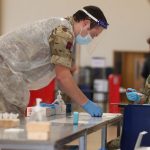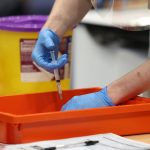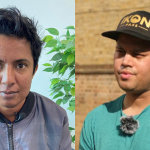Dozens of police officers across the UK have been convicted of crimes including rape, sexual assault and sex offences against children in the three years since the murder of Sarah Everard, new data shows.
Officers have also been convicted of assault, possession of indecent images, harassment and controlling and coercive behaviour since 3 March 2021 – the day Ms Everard was abducted, a Sky News investigation has found.
Just 19 forces out of 48 provided details of officers convicted of crimes – with one alleged victim of abuse by a policeman saying the figures are likely to be “just scratching the surface”.
Ms Everard was walking home in Clapham, south London, when she was abducted, raped and murdered by then-serving Metropolitan Police officer Wayne Couzens.
Data released by the 19 forces under the Freedom of Information (FOI) Act shows that in the three years since Ms Everard’s killing, at least 119 officers have been convicted of crimes.
The actual number is likely to be much higher as most forces – including the Met Police – did not provide details of officers’ convictions.
At least 16 officers were convicted of assault or battery. Nine were convicted of rape or sexual assault, with one also convicted of attempted rape, the forces revealed.
Oliver Campbell: Brain-damaged man ‘bullied’ by police into falsely confessing to murder, court hears
Seven Gwent Police officers under investigation over Cardiff crash which killed three
Pro-Palestinian protesters preventing police from ‘looking after communities’ – minister
Four were charged with sexual offences against children, including causing or inciting a child to engage in a sexual act, engaging in sexual communication with a child and sexual exposure to a minor.
Some 13 officers were convicted of possession or making of indecent images, four were convicted of possession of extreme pornographic imagery; two were convicted of fraud; two of controlling and coercive behaviour; one of harassment, and one of grievous bodily harm.
The majority of those convicted were men and serving as constables, according to the data.
The FOI requests were sent to the 39 territorial police forces in England, four in Wales, Police Scotland and the Police Service in Northern Ireland, as well as the Ministry of Defence Police, the Civil Nuclear Constabulary and the States of Jersey Police.
Some forces did not respond at all, with most citing delays and backlogs in initial emails.
Those that rejected Sky News’ requests said retrieving details of convictions by officers would require manual reviews of files that would exceed the time limit set out under the FOI Act.
The Met Police – where Couzens and serial rapists David Carrick and Cliff Mitchell all served – had not responded to Sky News’ request at the time of publication.
Rick Muir, the director of the Police Foundation thinktank, said: “There’s a massive problem with the quality of the data that these forces hold generally.”
Freya, not her real name, was married to a police officer who she claims used coercive control against her and allegedly raped her.
Now in her 50s, she says the first time she contacted police about his behaviour after he allegedly threatened her with a knife, officers just “had words” with him when he answered the door.
She says she reported him to police about the alleged rape when she tried to leave the marriage but she was never asked to provide a statement and was not informed of any further action taken against him.
Freya – who set up the website Police Me Too in 2021 to hear the accounts of abuse victims whose perpetrators were police officers – says she has severe PTSD and attempted to take her own life several times as a result of her experience.
Read more:
How Sarah Everard’s killer was caught
Timeline: Wayne Couzen’s behaviour and crimes
Freya said the number of known criminal officers is “just scratching the surface” due to the difficulties that victims face reporting offences.
“To me, I felt the organisation’s reputation was prioritised over protecting mine and my children’s lives,” she said.
“When it’s a police officer, you don’t have anywhere to go.
“We’re told to go to the police, but when it’s in police, who do you go to?”
“To me, this is about a deep, ingrained culture that goes back decades in every force in the country.”
While Mr Muir said it was “good news” that more people were reporting crimes against officers, he added: “It’s a negative thing in that it indicates that the culture within policing has allowed some of these people to continue as police officers for far too long.”
On Thursday, Lady Elish Angiolini’s report into Ms Everard’s rape and murder found that Couzens “could and should” have been stopped and called for a “radical overhaul” of police recruitment to stop “another Couzens operating in plain sight”.
Please use Chrome browser for a more accessible video player
The report highlighted how major red flags about Couzens were “repeatedly ignored” by police vetting and investigations.
In response to the data provided to Sky News, the National Police Chiefs’ Council (NPCC) said forces were “working towards a culture in policing where everyone feels they are able to recognise and report concerning behaviour, alongside members of the public reporting any worrying interactions with a police officer”.
NPCC chairman Gavin Stephens said: “The harrowing murder of Sarah Everard, carried out by a serving police officer, who abused his position of trust, has caused untold suffering. Wayne Couzens should never have been a police officer. His offending should have been stopped sooner. This should never have happened.
“As police leaders, we must do everything humanly possible to change policing for future generations, and we are taking action to ensure that there is nowhere to hide in policing for wrongdoers, that our misconduct and vetting processes are reformed, and that our ethics and values are reset.”
Be the first to get Breaking News
Install the Sky News app for free
He added: “We know that change has not been quick enough and that there is much more that we must still do.
“We do not underestimate just how important this is for society and we will not stop until the public, especially women and girls, get the police service they expect and deserve and their confidence in our role as protectors is rebuilt.”
Anyone feeling emotionally distressed or suicidal can call Samaritans for help on 116 123 or email [email protected] in the UK. In the US, call the Samaritans branch in your area or 1 (800) 273-TALK





















